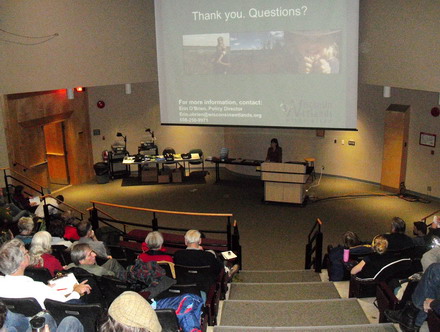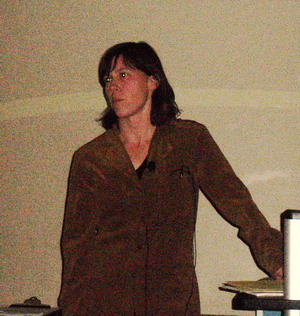Building Pipeline 'Inherently' Messy

'Think Pipeline' speaking tour begins at UNBC's Canfor Theatre
Prince George, B.C.- In detailing the U.S. state of Wisconsin's experience with the construction of an Enbridge oil pipeline in 2007, the policy director for the Wisconsin Wetlands Association says even with the best intentions and strong environmental permits in place, "Pipeline construction is inherently messy."
Scientist Erin O'Brien was speaking to approximately 75 people at UNBC's Canfor Theatre last night, as part of the launch of a speaking tour along the northwest corridor organized by the Sea to Sands Conservation Alliance, a Prince George-based group opposed to Enbridge's proposed 1700-kilometre twin pipeline from Bruderheim, Alberta to Kitimat.
 O'Brien says her group was not actively involved in trying to stop the pipeline because it was "a little more inevitable" than the proposed Northern Gateway pipeline, in that there were already two existing pipelines in the state and this one was a 515-kilometre addition to existing easements proposed by Enbridge Energy Partners LP, an Enbridge subsidiary.
O'Brien says her group was not actively involved in trying to stop the pipeline because it was "a little more inevitable" than the proposed Northern Gateway pipeline, in that there were already two existing pipelines in the state and this one was a 515-kilometre addition to existing easements proposed by Enbridge Energy Partners LP, an Enbridge subsidiary.
She points out that pipeline construction involves substantial temporary workspace as the permanent easement corridor for the pipeline is built. In this case, O'Brien says between 20-to 40-metres of temporary workspace was needed along the route, "And this was beyond a 24-metre permanent corridor where the pipes are actually being laid." She says the twin line crossed 242 rivers and 119-km of wetlands. "The impacts to wetlands included direct trenching through about 146-hectares and construction traffic through another 364, tree removal in 768-hectares, including 186 wooded-wetland conversion -- complete tree removal."
O'Brien says Enbridge had detailed environmental mitigation plans in place prior to construction as part of Wisconsin's strict permitting process, but efforts by state officials to deal with violations went unheeded. "In May of 2008, our Wisconsin Department of Natural Resources referred Enbridge to our Department of Justice for prosecution, as a result of numerous violations of their permits." In 2009, Enbridge reached an out-of-court settlement for $1.1-million dollars, with stipulations the company had to remedy the problems that had occurred along the way.
O'Brien says the civil complaint documented more than 500 violations on a project substantially smaller in scope than the one being considered through B.C. and Alberta. She says, "It's just a big job and lots of people and it's really hard to control and adhere to these kinds of 'best management practises': we have human error, we have weather events, ecetera."
She also cautions that in Wisconsin, one pipeline led to another...she says with the infrastructure is in place, the land cleared and the corridor set up, many of the legal documents and agreements are written with expansion in mind. "So I wouldn't assume that only one pipeline will run along this corridor, if it's constructed."
Previous Story - Next Story
Return to Home










